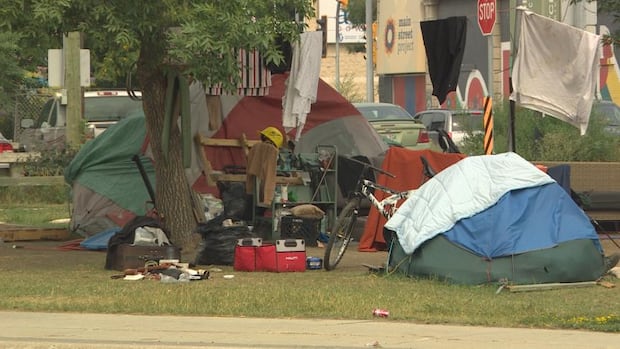Ban homeless encampments beside major roadways, says Winnipeg city councillor
Motion to ban tents in some areas is ‘coming out of frustration’ and offers no practical solution: non-profit

Winnipeg Coun. Jeff Browaty says tent encampments alongside major roads are a safety issue and he wants to see them banned.
He intends in September to submit an amendment to a motion fellow Coun. Cindy Gilroy tabled last week to prohibit encampments in public places where children gather — playgrounds, spray pads, community gardens and community centre spaces.
Browaty called Gilroy's motion "a good, important first step" but said it should go further. He planned to speak to her Wednesday "to see if she would be amenable to having this added on."
The addition would be a restriction on encampments beside thoroughfares to further increase the safety of all people in the city, he said.
That would include Portage Avenue, Main Street, McPhillips Street, Henderson Highway, Regent Avenue, St. Mary's Road, St. Anne's Road, Pembina Highway, Kenaston Boulevard, Abinojii Mikanah and Lagimodiere Boulevard — a list of roads Browaty said were "off the top of my head."
The danger of people experiencing addictions and mental health issues while living beside those roads is they might wander into traffic, he said.

"I hear from residents, especially around Disraeli, they're worried somebody's going to get hit. Members of the public that are driving down these streets, they don't want to cause a fatality. They're just trying to get home," Browaty said.
"This is why this is unacceptable."
Browaty said he's not pretending such a ban will "fix the ills of the city," but he hopes it helps avoid some tragedy.
Addressing those larger issues requires more housing with wraparound supports, he said.
"Obviously we need more and we need it faster," he said.
In the short term, "we need to encourage and find ways to make living on the street undesirable" for those who do have the capacity to move into any form of existing housing, such as with friends or family, he said.
Couch surfing "is better than living on the street," he said.
For those with more severe challenges, there needs to be quicker movement on getting "deeper supports" and proper housing, he said.
Mayor Scott Gillingham said in a statement to CBC News on Wednesday that encampments near major roadways raise "serious safety concerns" and he supports looking at whether encampments should be restricted in these areas.
The city aims to "clean up encampments in a way that keeps people safe and can stand up to a legal challenge," Gillingham said.
There are legal challenges in forcing people out of encampments, but at the very least, Browaty wants to see those who are breaking laws dealt with as soon as possible.
"If there's use of drugs in these areas openly, enforce that. If they're running bicycle chop shops, as I've heard that they apparently are along Disraeli, follow up on that. Find any laws that are being broken and enforce those stringently," he said.
The Manitoba government has been slowly adding to public housing stock to address homelessness. As part of the province's Your Way Home strategy launched earlier this year, those units are being offered to people living in encampments.
Jamil Mahmood, executive director at Main Street Project, said Gilroy's motion appears to be "coming out of frustration" and does little to address a lack of housing, addictions supports and access to mental-health care.
He said pushing encampments out of existing areas could force the people living there to move to back lanes, private property or hard-to-access areas. This could potentially increase the number of encampments across the city, while making it harder for outreach workers to provide services to those in need.
That could lead to more overdose deaths, Mahmood said.
"We can play Whack-a-Mole with encampments and move them all around the city, does that benefit anybody, does that address the problem, does that lead to long-term solutions? We don't think so," Mahmood said.
He said "the whole city has to work together" to give people living in encampments the housing and supports they need, including government, non-profit organizations and private housing owners.
"Let's create responses that work for everybody in our city, but also don't dehumanize or hide homelessness because hiding it doesn't solve the problem," he said.
Landlords 'essential to ending short-term homelessness quickly'
Sam Tsemberis, the founder and executive director of Pathways to Housing, a Housing First program for people with serious mental illnesses, long histories of homelessness and substance abuse, said it's time to bring landlords into the conversation.
"Both the private landlords and the social housing landlords are essential to ending short-term homelessness quickly," he told CBC Manitoba Information Radio host Marcy Markusa on Tuesday.
That means governments and other agencies helping people in encampments should present them to landlords with a rent subsidy, the first month's rent and a guarantee of support for the tenant once they move in, Tsemberis said.
"So that the landlord is willing to take the risk to house someone without a credit history and coming in with that difficult background."
Avrom Charach, spokesperson for the Manitoba Professional Property Managers Association, agrees that supports — and not just financial supports — are absolutely necessary to enlist landlords.
"About 20 years ago, when Housing First first hit in Winnipeg … my company that I worked for took the very first Housing First person in. What we found was after 5 p.m. on a weekday, you couldn't find support," he said.
"If people were flailing, you ended up having to treat them like any other tenant. It's like, 'I'm sorry, you can't live here anymore,' because you couldn't get someone to come in and help deal with their issues."

For some people, all they need is a social worker to talk to, so they know how to behave around others, Charach said. Last year, a tenant would glare at people in the hallways and lash out if someone even looked at them, he said.
In other cases, even though the rent is being paid, tenants are damaging property beyond what any damage deposit will cover, he said.
Charach plans to call Bernadette Smith, Manitoba's minister of housing, addictions and homelessness, to see what part his association can play, but says many members who stepped up when Housing First began might be less willing now.
However, there have been improvements, he said. Landlords who house tenants supported by some service agencies do have a number to call if someone is having a breakdown, and the response has been good, he said.
Altogether, there are 74 members in Charach's association with many housing units.
"If each one of our members … put two people in, it would be 150, easy," he said.
"And two people is not a lot to take. So we could probably house 200 or 300 if vacancy is there, and if they meet the three very simple criteria that we use: pay the rent, don't bother the neighbours and don't damage the property."
WATCH | Coun. Jeff Browaty speaks about banning encampments:
Corrections
- We initially reported that Coun. Cindy Gilroy tabled her motion this week. In fact, it was last week.Jul 23, 2025 5:08 PM EDT
With files from Alana Cole and Mike Arsenault
